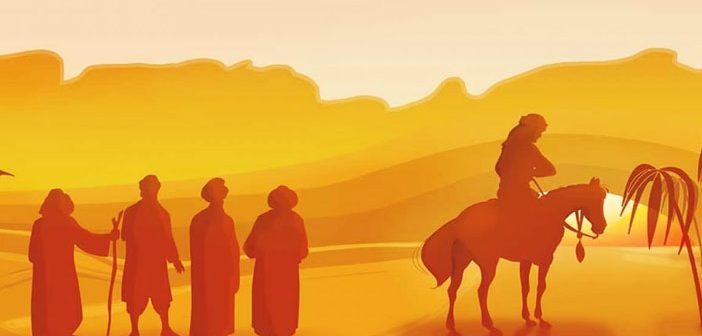When did the years of boycott finish towards Muslims? Here’s answer…
At the end of three years of agony, the Almighty set loose a maggot on the written pact of the boycott which the idolaters had posted inside the Kaabah. Except for the words Bismik Allahumma (In your Name O Allah), the maggot ate away the entire document of cruelty and oppression. Informed through Revelation, the Prophet -upon him blessings and peace- disclosed the event to his uncle Abu Talib who, in turn, informed his brothers, telling them, “Wear your neatest clothes and go to Quraysh! Tell them about the fate of the pact before they find out!”
Straight after the idolaters were told of the matter by Abu Talib and his brothers, they sent a person to fetch the written pact, who brought it in the very condition the Prophet -upon him blessings and peace- had told them. The idolaters were frustrated. Encouraged, Abu Talib spoke out:
“Do you now understand you have done wrong and oppressed your people?”
There was not a word. Some eventually began mumbling:
“This has got to be magic!” After that they raised pretexts, once again turning their backs on the clear truth. But some Qurayshi men did begin to feel remorse for what they did and began to look for a way out. It was now the tenth year of prophethood when a few idolaters made a move to lift the boycott. Telling off Zuhayr ibn Abi Umayya was Hisham ibn Amr:
“Listen to me Zuhayr! How can you be content doing as you wish, while your uncles struggle in poverty and are prevented from even the simplest rights of trade and marriage? If you had called Abu Jahl to a pact against his uncles, I swear he would not have listened to you!”
After convincing Zuhayr, Hisham was able to win over, one by one, Mutim ibn Adiyy, Abu’l-Bakhtari and Zam’a ibn Aswad. At night, the five met at Hajun in upper Mecca to discuss the moves they were to make. They vowed to struggle until the boycott was lifted.
The next morning they went to the Kaabah. Wearing expensive clothing, Zuhayr circumambulated the Great House after which he said, “Meccans! How can it be that we can live to our heart’s content while we leave the Hashim and Muttalib clans to perish? I swear to God that I shall not sit until the vicious pact that has done away with all blood ties is torn!”
Abu Jahl’s protests fell on deaf ears once the four friends expressed their support, which suddenly created an encouraging atmosphere. At once, Mutim got up and tore the pact hanging on the wall. Arming themselves, Adiyy ibn Qays, Abu’l-Bakhtari and Zuhayr headed towards the quarters of Abu Talib, making sure the Muslims returned to their homes. Thus with Divine blessing, Muslims were finally freed from the fierce three-year siege. Abu Talib read a poem in praise of those who ended the boycott. Meanwhile, the diehard idolaters had all but lost hope in ever preventing the Messenger of Allah -upon him blessings and peace- from inviting people to Islam.[1]
In the end, such hardships served to strengthen the faith of believers and their ranks, while, as always, they added to the idolaters’ misery.
In the meantime, during the course of the eight years of prophethood, the Persians had defeated the Byzantines in successive battles and laying waste to their cities had reached as far as the gates of Constantinople, forcing the humbled Byzantines to pay a hefty tribute.
As the Persians too were idolaters, the Meccans were delighted by their victory. The Prophet -upon him blessings and peace- was, however, left disheartened by the Byzantine defeat, the People of the Book, at the hands of the Persians. But just then the following ayah were revealed:
الم غُلِبَتِ الرُّومُ فِى اَدْنَى اْلاَرْضِ وَهُمْ مِنْ بَعْدِ غَلَبِهِمْ سَيَغْلِبُونَ فِى بِضْعِ سِنِينَ لِلَّهِ اْلاَمْرُ مِنْ قَبْلُ وَمِنْ بَعْدُ وَيَوْمَئِذٍ يَفْرَحُ الْمُؤْمِنُونَ بِنَصْرِ اللهِ يَنْصُرُ مَنْ يَشَاءُ وَهُوَ الْعَزِيزُ الرَّحِيمُ
“The Romans have been defeated in the nearer land, and they, after their defeat, will be victorious again within a few years. Allah’s is the command before and after; and on that day the believers shall rejoice in the victory of Allah; He supports whomever He pleases. And He is the Mighty, the Merciful.” (ar-Rum, 1-5)
“Defeat is surely near for the Persians!” the Messenger of Allah -upon him blessings and peace- remarked. (Ahmed, I, 276)
Hearing the Divine news, Abu Bakr –Allah be well-pleased with him- made a wager with idolater Ubayy ibn Khalaf for ten camels that the Byzantines would defeat the Persians within three years.[2]
He then told the Prophet -upon him blessings and peace- of the wager, who said, “The word bid’ actually means a period from three to ten years. So now go and increase the term and the number of camels!” Abu Bakr –Allah be well-pleased with him- then increased the time to nine years and the amount of camels to a hundred.
The Byzantines swiftly regained strength to score a crushing victory over the Persians. Collecting the hundred camels due from Ubayy, Abu Bakr –Allah be well-pleased with him- brought them to the Prophet -upon him blessings and peace-, who advised him to deal them out to the poor. And he did exactly that.
The Quran’s miraculous prediction led to the guidance of many idolaters.[3]
[1] See Ibn Hisham, I, 397-406; Ibn Saad, I, 210-211.
[2] The event precedes the prohibition of betting.
[3] See Tirmidhi, Tafsir, 30/3194; Qurtubî, XIV, 3.
Source: Osman Nuri Topbaş, The Prophet Muhammed Mustafa the Elect, Erkam Publications
SIMILAR ARTICLES
- WHAT IS ISLAM?
- THE FAMİLY TREE OF PROPHET MUHAMMAD SAW
- THE ESSENTIALS OF ISLAMIC FAITH
- FREE İSLAMİC BOOKS READ AND DOWNLOAD PDF
- MORALITY IN ISLAM





